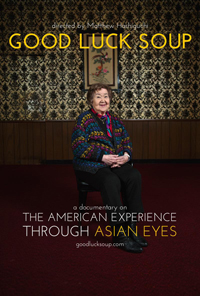 Good Luck Soup (2016)
Good Luck Soup (2016)
When my wife's grandfather returned from his life as a missionary in Japan, he ended up back home participating in an unsavory episode of American history — he was a translator in the Japanese internment camps. That's the subject of this one-hour PBS documentary. After the attack on Pearl Harbor, the United States imprisoned about 120,000 people of Japanese ancestry. About two-thirds of these people were American citizens. The filmmaker Matthew Hashiguchi grew up half Japanese/half Italian in a white Irish-Catholic neighborhood in Cleveland, and was always deeply ambivalent about his ethnic identity: "I didn't want to be white, but I definitely avoided my Japanese heritage, and tried to be more Italian." He found a role model in his grandmother Yoshida, who had her own unique story. Yoshida was 16 when she was interned in one of the camps: "I didn't talk about camp life because I wanted to forget about it and to erase it from my mind completely. I thought I would return [from the internment camps] in a month or two, but it ended up taking over two years of my life. I never got to college." She was 19 when she left the camps, and moved to Cleveland, where the Jewish community there helped them to resettle. Yoshida has no time for bitterness, "there's no time for that." The title of the film comes from a traditional dish served on New Year's Day. I watched this film on the PBS website.


